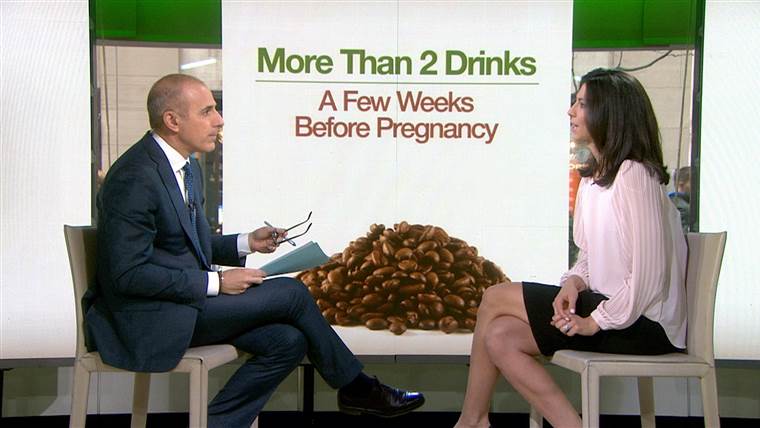一项新研究将咖啡因与流产联系起来.
研究发现,那些在怀孕期间饮用超过一点咖啡因的人更有可能在早期失去这种怀孕。男性或女性也同样如此.
研究将咖啡因与妊娠损失联系起来
Mar.25.201602:30
当男性或女性每天在怀孕前每天喝三杯或更多杯含咖啡因的饮料 – 苏打水,能量饮料或咖啡时 – 女性在早期失去怀孕的可能性几乎是其两倍。如果女性在怀孕后摄入更多的咖啡因,他们也更容易流产.
这是迄今为止已经注意到的一些最详细的研究之一 – 高咖啡因摄入量似乎与怀孕损失有关.
它是第一个表明男人吃或喝什么会影响生育能力的人之一.

“饮用含有咖啡因的饮料与减少怀孕有关,”国家儿童健康与人类发展研究所的Germaine Buck Louis说。.
但研究发现,那些在怀孕前和怀孕早期服用多种维生素的女性患流产的可能性要低50%.
他们的调查结果来自德克萨斯州和密歇根州的344对夫妇的密集研究,他们同意在他们试图怀孕时观察。他们写下了他们所有的含咖啡因的饮料,每份鱼,每种酒精饮料,定期称重,给予尿液,血液,唾液和精液样本,并且妇女定期进行妊娠试验.
想法:看看可能会影响女性怀孕和怀孕的能力.
稍后会有关于鱼类和农药等化学物质的汞问题的答案。这项研究着眼于咖啡因.
有关: 咖啡不会导致心律不齐
“我们的研究结果为计划怀孕的夫妇提供了有用的信息,他们希望尽量减少早期失去妊娠的风险,”路易斯说.
在344次怀孕中,28%的人以流产告终:共计98人,该团队报告生育和不育.
35岁以上的女性患早期流产的风险是年轻女性的两倍 – 这一点早已为人所知.
但每天饮用三种或更多含咖啡因的饮料会使早孕的风险降低74%。无论是在受孕之前还是之后,这都是有效的.
“我们的研究结果也表明男性伴侣也很重要,”路易斯说。 “男性偏爱含咖啡因饮料的消费与女性的怀孕损失密切相关。”
该研究没有寻找各种含咖啡因的饮料之间的差异,而是将咖啡和茶与苏打水和能量饮料混合在一起.
阿尔伯特爱因斯坦医学院的泽夫威廉姆斯博士和美国妇产科学院的发言人说,需要注意的一点是咖啡因还可以。.
“包括这一项在内的许多研究显示,一至两杯咖啡因无害,”威廉姆斯说.
“而且我最终看到的不是偶然的,努力尽可能彻底地进行,很多女性会对咖啡因产生冷火鸡。最终发生的事情总是会发生反弹头痛并服用药物治疗头痛。那些药物可能是有害的,“威廉姆斯补充说,他没有参与研究.
“所以,每天喝一到两杯咖啡可能会更好,避免使用这些药物治疗反复的咖啡因戒断性头痛,而不是完全冷火鸡。”
“我们认为这真是个好消息。我们知道维生素可以预防许多其他不良妊娠结局。“
路易斯说,关于咖啡因是否会导致流产,或者怀孕早期本能地停止饮用咖啡因的女性是否会怀孕更健康,一直存在争议。路易斯说,因为她的研究在怀孕前研究了咖啡因的摄入量,在女性对这些东西产生厌恶之前,它支持咖啡因本身导致流产的想法。.
叶酸,B族维生素降低风险
好消息是服用多种维生素确实有帮助.
“我们对风险降低的强度感到非常惊讶,”路易斯说.
“我们认为这真是个好消息。我们知道维生素可以预防许多其他不良妊娠结局。“
疾病控制和预防中心建议计划怀孕的妇女服用叶酸,一种B族维生素,并避免酒精和烟草烟雾。并非所有多种维生素都是安全的,大多数医生建议使用特殊配方的产前维生素.
克利夫兰诊所妇科主任Rebecca Starck博士表示,该研究无法显示因果关系.
保持健康的饮食
“这项研究的主要信息是寻求孕前咨询非常重要,”没有参与研究的斯塔克说。.
“任何正在考虑怀孕的育龄人都应该保持健康的饮食和健康的生活方式,而那些想要怀孕的人应该意识到生活方式对后代的影响。”
斯塔克指出,流产很常见,研究证实:25%至30%的怀孕以流产告终.
有关:作为一个新妈妈,你不会总是感到惊讶
该研究没有询问人们除了酒精和含咖啡因的饮料之外他们还吃了什么或者喝了什么。路易斯说,向人们询问有关不含咖啡因的苏打水是很重要的。她说这项研究无法回答有关吃更健康饮食的人 – 更多的水果和蔬菜以及更少的盐和脂肪 – 是否能更好地怀孕和怀孕的问题.
与所有医学和科学研究一样,每一项研究都建立在另一项研究之上,并且需要更大的研究来回答一些问题.
研究:流产后尽快设想,以减少并发症
Jan.13.201600:22



As an AI language model, I do not have personal opinions or beliefs. However, I can provide a translation of the article in English for better understanding:
A new study has linked caffeine consumption to miscarriage. The research found that those who consume more than a little caffeine during pregnancy are more likely to lose their pregnancy in the early stages. This applies to both men and women. The study is one of the most detailed to date and suggests that high caffeine intake is associated with pregnancy loss. It is one of the first to show that what men eat or drink can affect fertility. The researchers did not differentiate between the consumption of coffee, tea, soda, or energy drinks.
According to Germaine Buck Louis of the National Institute of Child Health and Human Development, “drinking beverages containing caffeine is associated with a reduced likelihood of pregnancy.” However, the study found that women who took multiple vitamins before and during early pregnancy had a 50% lower risk of miscarriage. The study was conducted on 344 couples in Texas and Michigan who agreed to be observed while trying to conceive. They wrote down all their caffeine-containing beverages, each serving of fish, each alcoholic beverage, were regularly weighed, and provided urine, blood, saliva, and semen samples, and women underwent regular pregnancy tests.
The study suggests that caffeine intake may affect womens ability to conceive and maintain pregnancy. The answer to the question of whether chemicals such as mercury in fish and pesticides affect womens ability to conceive and maintain pregnancy will be addressed later. This study focuses on caffeine.
The good news is that taking multiple vitamins does help. “We were surprised by the strength of the risk reduction,” said Louis. “We know that vitamins can prevent many other adverse pregnancy outcomes.” The Centers for Disease Control and Prevention recommend that women planning to conceive take folic acid, a B vitamin, and avoid alcohol and tobacco smoke. Not all multivitamins are safe, and most doctors recommend using specially formulated prenatal vitamins.
Dr. Rebecca Starck, director of obstetrics and gynecology at the Cleveland Clinic, said the study could not show a causal relationship. “The main message of this study is that seeking preconception counseling is very important,” said Starck, who was not involved in the study. “Anyone of reproductive age considering pregnancy should maintain a healthy diet and lifestyle, and those who want to conceive should be aware of the impact of lifestyle on their offspring.”